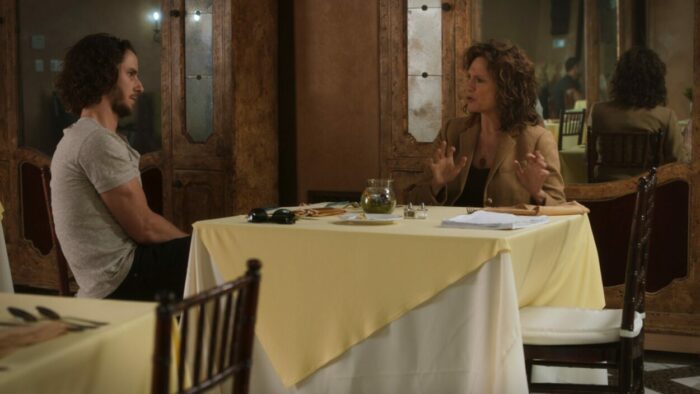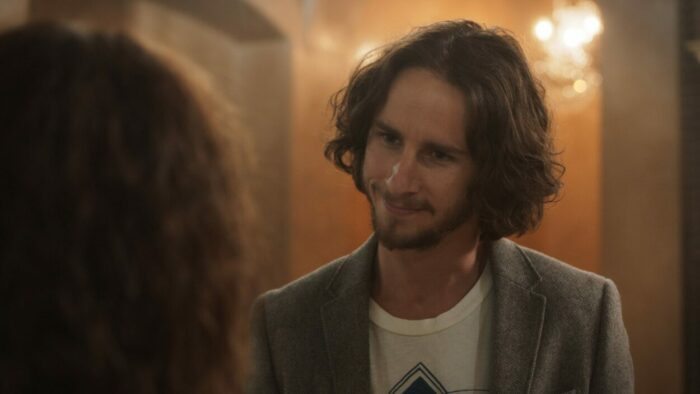Loren & Rose, a quiet dinner-table drama showing at the 2023 Twin Cities Film Festival, is one of those films that commits fully to its conceit. Writer-director Russell Brown frames the three-act story between its two principal characters in the course of three meals, each of them two years apart, at the same table in the same restaurant. While there’s a Citizen Kane-like framing device—a life’s possessions being sorted through for an estate auction—all of the film’s action is limited to two characters at a table, in dialogue.
You might be thinking along the lines of they better be damn good actors!
And you’d be right. Like the much-loved My Dinner with Andre, a film like Loren & Rose places a high premium on its leads to convey emotions, yet temper them with the knowledge of their being in a public place; to react to each other plausibly; to convey their own stories convincingly; and to engage not only each other but the audience as they do so.
Fortunately, Brown, who reports he knew the actress socially for some time, cast Jacqueline Bisset as Rose, a movie star past her prime looking for a chance to reinvigorate her flagging career. Bisset, who made her splash in 1968, may have been better known in her heyday for her beauty than her talent. François Truffaut recognized her star power early on, her ability to hold the camera’s attention: fifty years ago, she was his muse in La nuit Americain / Day for Night, and she went on to star in films throughout the ’70s and ’80s before settling into a variety of supporting roles, teleseries, and cameos.
Her character here, Rose, followed a similar career arc with an arthouse hit in the 1970s (titled Lisa Overnight) but hit lower lows—several straight-to-video stinkers and self-help books that led to time in a cult—and hopes her meeting with a young, aspiring film director will help resuscitate her career. And Bisset still, at 79, knows exactly how to command an audience. She is Loren & Rose‘s raison d’être. Her Rose is witty, wise, charming, demanding, confident, and troubled. Well-traveled and well-versed, her life has been rich with art, music, literature, cuisine, and, to be frank, sex; her personal relationships, especially with her daughter Denise (Erin Cahill), have been less fulfilling.

If Bisset is the main attraction, the actor playing the other titular character, Loren, has a difficult job. He—Kelly Blatz—must both convey his own character’s aspirations and sentiments while yielding to Bisset’s far greater experience and accomplishment. Blatz’s Loren is a young film director, fresh off the festival success of a short film and eager to cast his first feature with Rose as his star. He’s a cinephile and fan of her one great arthouse hit as well as her later B-movie dreck and interesting failures. Aside from his devotion to film and an aversion to haute cuisine, there’s little to Loren’s characterization: he’s there mostly to ask questions, react to Rose, and, over the four years of the film’s primary narrative, help establish narrative facts. His character, like hers, has an arc, but it’s one that makes little impression.
A film so focused on dinner-table dialogue demands much of the two actors in front of the camera. There’s also the challenge of working behind it to create visual interest. Nearly all of Loren & Rose takes place at the same restaurant, at the same table, with the two characters framed in close-up over-the-shoulder shots. Occasionally, Brown offers up a brief flashback or scenes from the estate-auction framing device, though these add little to the story other then relief from the claustrophobic setting and framing. The mise-en-scène and props from Rose’s career feel less than completely convincing. There’s something of a running gag about Loren’s overuse of the zoom that might well be applied to Brown’s. Even his camera gets restless and veers in and out during the dialogues between them, sometimes to the unnecessary intrusion of the soundtrack.

There’s really no great solution to the visual tedium that results from a film consisting of a long dialogue in a single restaurant unless it’s conducted between two great actors. And Loren & Rose has one. That it exists to provide Jacqueline Bisset this small gem of a role in what I assume, I hope wrongly, is the twilight of her career, is certainly enough to satisfy any of her fans. Other cinemagoers might find the film’s heartfelt affirmation of the two characters’ growing friendship in the face of daunting adversity less enthralling. Loren & Rose is a film with good intentions, a warm heart, a fondness for the medium, and a single great performance—that may or may not be enough to warrant your viewing.




